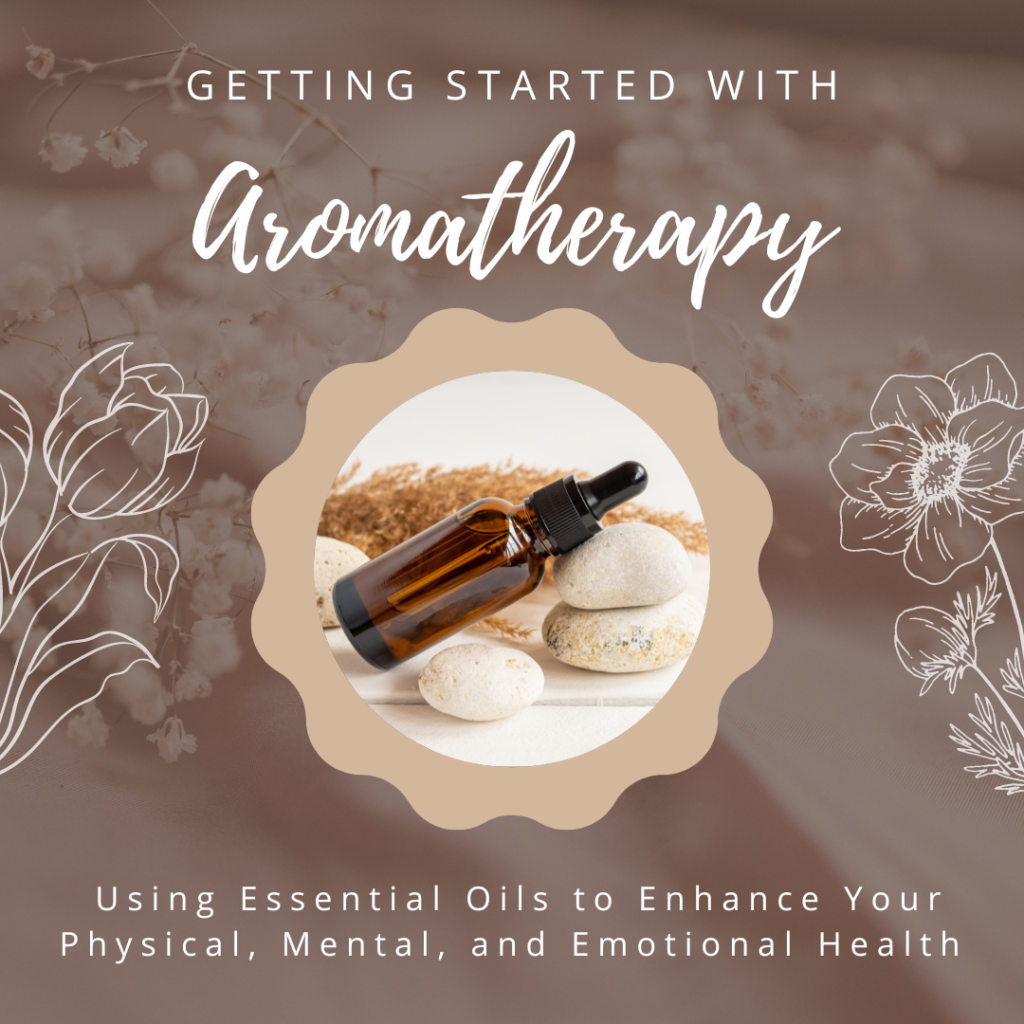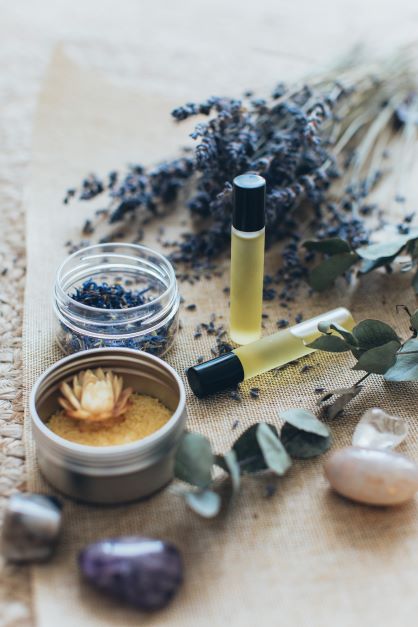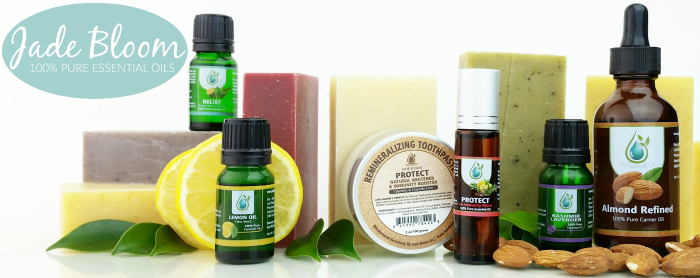
Aromatherapy is a holistic wellness practice that uses natural aromatic compounds to support physical, emotional, and mental health. Essential oils are the concentrated, volatile essences of plants and have been used for centuries for their therapeutic properties.
How Does Aromatherapy Work?
Aromatherapy can be used in a number of ways, including diffusing essential oils into the air, applying them topically, or inhaling them.
- Aromatic use: When used aromatically, essential oils are absorbed by the olfactory system and stimulate the limbic system – the part of the brain that controls emotions. This can help to promote feelings of relaxation, calm, and well-being.
- Topical use: Topical application of essential oils allows them to be absorbed through the skin and into the bloodstream where they can then travel to the body’s organs and systems. This method can be used to support localized areas of concern, such as muscle tension or inflammation. Essential oils can also be added to baths or used in massage. When used in these ways, the benefits of aromatherapy can be enjoyed over a longer period of time.
- Inhalation: Inhaling essential oils is a quick way to experience their benefits as they are absorbed directly into the lungs and circulated through the body. This can be done by using a diffuser or by simply placing a few drops on a tissue or cotton ball to inhale throughout the day.
Are Essential Oils Safe?

When used correctly, aromatherapy is a safe and effective way to support your overall health and well-being.
Essential oils are generally safe when used as directed by the manufacturer. However, they are potent substances and should be used with care. It is important to choose quality essential oils from reputable sources and to follow all manufacturer’s instructions for use.
Some aromatherapy recipes call for the use of undiluted essential oils on the skin. This can be dangerous and should be avoided. Always follow dilution ratios to ensure safe skin application of essential oils.
If you are pregnant, nursing, or have a medical condition, consult your healthcare provider before using essential oils. Children are often more sensitive to the effects of essential oils than adults. It is important to use essential oils only as directed when children are present.
What Are the Benefits of Aromatherapy?
Aromatherapy can be used in a variety of ways to support health and well-being. Essential oils can be used to help with:
- Anxiety and depression: Aromatherapy can help to reduce anxiety and depression by promoting relaxation.
- Chronic pain: Aromatherapy can be used to ease chronic pain by helping to reduce inflammation and improve circulation.
- Digestive issues: Certain essential oils can help to relieve digestive issues like constipation, nausea, and gas.
- Fatigue: Some essential oils can help to boost energy levels and improve mental alertness.
- Headaches: Aromatherapy can help to relieve headaches by reducing inflammation and improving circulation.
- Insomnia: Aromatherapy can be used to improve sleep quality by promoting relaxation and easing anxiety.
- Skin conditions: Essential oils can be used to treat various skin conditions.

What Are the Most Commonly Used Essential Oils?
There are a wide variety of essential oils that can be used for aromatherapy. Some of the most commonly used essential oils include:
- Bergamot: Bergamot essential oil is refreshing and uplifting. It can be used to improve mood and reduce stress, and to promote healthy skin.
- Eucalyptus: Eucalyptus essential oil is cleansing and purifying. It can be used to support respiratory health and to relieve muscle and joint pain.
- Frankincense: Frankincense essential oil is grounding and calming. It can be used to reduce stress and anxiety and to promote a sense of well-being.
- Lavender: Lavender essential oil is known for its calming and relaxing properties. It can be used to help reduce stress and anxiety and promote restful sleep.
- Lemon: Lemon essential oil is uplifting and energizing. It can be used to boost mood and immunity and to cleanse and purify the air.
- Peppermint: Peppermint essential oil is refreshing and invigorating. It can be used to improve mental clarity and focus and to relieve headaches and muscle pain.
- Roman chamomile: Roman chamomile essential oil is calming and soothing. It can be used to reduce stress and anxiety and to promote a restful night’s sleep.
- Tea tree: Tea tree essential oil is purifying and cleansing. It can be used to support immunity and to soothe skin irritations.
- Ylang ylang: Ylang ylang essential oil is calming and relaxing. It can be used to reduce stress and anxiety and to promote a restful night’s sleep.
There are many other essential oils that can be used for aromatherapy, depending on your specific needs. If you’re unsure which essential oils to use, consult with a qualified aromatherapy practitioner.
What Should I Know About Blending Essential Oils?
Different essential oils can be combined together to create a custom aromatherapy blend. When blending essential oils, it’s important to consider the desired effect of the blend, as well as the individual properties of each oil.
For example, some essential oils are known for their ability to calm and relax, while others may be more energizing. If you’re looking to create a relaxing blend, you might combine lavender and chamomile essential oils. For an energizing blend, you might mix together grapefruit, rosemary, and peppermint essential oils.
It’s also important to consider the aromas of each essential oil when creating a blend. A good rule of thumb is to mix together oils with complementary or similar aromas. For example, if you’re using a floral essential oil like lavender, you might pair it with another floral oil like geranium. Or, if you’re using a citrus oil like grapefruit, you might mix it with another citrus oil like lemon.
When blending essential oils, always start with a small amount of each oil and gradually increase the quantity until you reach the desired scent. It’s also a good idea to keep a journal of your blends so you can recreate them in the future.
How Should I Store My Essential Oils?
Essential oils should be stored in a cool, dark place to maintain their potency and shelf life. They can also be stored in amber glass bottles with airtight lids to protect them from light exposure.
The shelf life of essential oils depends on several factors, including the type of oil, how it’s stored, and how often it’s used. Generally speaking, most essential oils will last for 1-2 years when stored properly.
Where Can I Learn More About Aromatherapy?
If you’re interested in learning more about aromatherapy, there are many resources available online and in libraries. You can also find aromatherapy courses offered by colleges and universities, as well as aromatherapy certification programs.